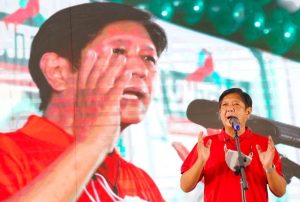With just over a month to go until the Philippines’ presidential election, Vice President Leni Robredo is slowly gaining ground on presidential front-runner Ferdinand Marcos Jr, according to a new poll published yesterday.
According to surveys conducted by Pulse Asia in mid-March, support for Robredo rose to 24 percent, up from 15 percent in the last Pulse Asia survey in February. Meanwhile, backing for Marcos, the son of the country’s late dictator Ferdinand E. Marcos, fell slightly to 56 percent, four points lower than the last survey.
The Pulse Asia survey, which was conducted between March 17-21, the first survey to be conducted after official campaigning was underway, suggests that the election has effectively become a two-horse race, in which the rest of the fractured field lags far behind. Manila Mayor Francisco “Isko Moreno” Domagoso commanded the support of just 8 percent of respondents in the Pulse Asia survey, followed by former boxing champion Manny Pacquiao (6 percent) and Senator Panfilo Lacson (2 percent).
The survey also showed that Marcos’s running mate, Sara-Duterte Carpio, the mayor of Davao City in the southern Philippines and the daughter of incumbent President Rodrigo Duterte, remained the top choice for vice president, with 56 percent support in the survey. This was followed by Senate President Vicente Sotto, who commanded the support of 20 percent support of respondents.
While the Marcos-Duterte tandem remains in a dominant position as the election campaign enters its home stretch – his 32-point lead would seem to be simply too large to reel in by May 9 – the one hope for Robredo’s campaign was her gains among younger voters. Marcos was the top choice of all age groups, but Robredo, who narrowly beat Marcos to the vice presidency in 2016, scored a 16 percent increase in support among 18- to 24-year-olds over February’s survey. She now has a 30 percent score among these voters, compared to only 14 percent a month ago. Meanwhile support for Marcos among this age group dropped from 71 percent in February to 57 percent in this week’s survey.
About the best hope that Robredo has is that she manages to build her popularity among the young to a sufficient degree to reel in Marcos, and to capitalize from the frontrunner’s apparent reluctance to submit himself to public scrutiny. (The younger Marcos has refused to take part in recent presidential debates, perhaps on the assumption that he could only lose by opening himself up to questioning from his rivals.) But as my colleague David Hutt pointed out in an article today, there is no obvious correlation between youth and the liberal values that Robredo claims to represent. Exit polls conducted during the last election in 2016 showed President Rodrigo Duterte, a reactionary law-and-order candidate, winning a 33-point lead over his closest rival among voters aged 18 to 24, and a 26-point lead among the 25 to 34 age group. Not coincidentally, this is exactly the advantage that Marcos currently enjoys among the youngest voters.

































